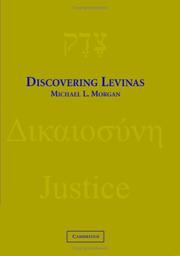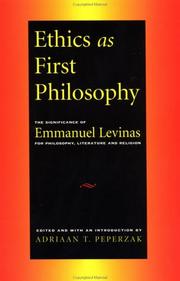| Listing 1 - 10 of 121 | << page >> |
Sort by
|

ISBN: 9781402061219 9781402061226 Year: 2007 Volume: 183 Publisher: Dordrecht Springer
Abstract | Keywords | Export | Availability | Bookmark
 Loading...
Loading...Choose an application
- Reference Manager
- EndNote
- RefWorks (Direct export to RefWorks)
Emmanuel Lévinas est le philosophe de la non-indifférence; il n'est en aucune sorte un philosophe indifférent. Son inquiétude personnelle et engagement politique ont trouvé une expression philosophique dans une quête à deux versants. Dans le versant ontologique, il cherche à montrer que même si l'homme est l'événement de compréhension de l'être, tout l'homme et toute signification ne se réduisent pas à la compréhension de l'être seul. Dans le versant politique, il s'interroge sur la possibilité de soumettre la tendance totalitaire de toute politique à une recherche de justice qui ne dépend pas finalement de la politique même. Mais ces deux versants n'en font qu'un. La découverte d'une signification qui excède la compréhension de l'être - l'éthique - fournit en même temps la source de renouvellement de la justice. Ainsi, par cette double question, Lévinas nous présente les fils conducteurs de notre enquête : une signification au-delà de la compréhension de l'être et sa portée éthique, que nous appelons « langage » et que nous explorons dans la perspective de son importance politique. Les études analytiques dans lesquelles les notions de politique et de langage fonctionnent comme clef d'interprétation mutuelle débouchent sur une critique centrée sur deux problèmes : l'impossibilité d'interpréter la signifiance de l'autre et le danger inhérent à la conception d'une justice dépassant l'Etat.

ISBN: 9780521872591 9780521759687 9780511805240 9780511290473 0511290470 0511805241 0521759684 0521872596 1107180775 1280917288 9786610917280 0511289871 051128859X 0511301839 0511289278 Year: 2009 Publisher: Cambridge Cambridge University Press
Abstract | Keywords | Export | Availability | Bookmark
 Loading...
Loading...Choose an application
- Reference Manager
- EndNote
- RefWorks (Direct export to RefWorks)
In Discovering Levinas, Michael L. Morgan shows how this thinker faces in novel and provocative ways central philosophical problems of twentieth-century philosophy and religious thought. He tackles this task by placing Levinas in conversation with philosophers such as Donald Davidson, Stanley Cavell, John McDowell, Onora O'Neill, Charles Taylor, and Cora Diamond. He also seeks to understand Levinas within philosophical, religious, and political developments in the history of twentieth-century intellectual culture. Morgan demystifies Levinas by examining his unfamiliar and surprising vocabulary, interpreting texts with an eye to clarity, and arguing that Levinas can be understood as a philosopher of the everyday. Morgan also shows that Levinas's ethics is not morally and politically irrelevant nor is it excessively narrow and demanding in unacceptable ways. Neither glib dismissal nor fawning acceptance, this book provides a sympathetic reading that can form a foundation for a responsible critique.
Lévinas, Emmanuel. --- Lévinas, Emmanuel --- Levinas, Emmanuel --- Lévinas, Emmanuel. --- Arts and Humanities --- Religion --- Levinas, Emmanuel.

ISBN: 9780826472830 0826472834 Year: 2004 Publisher: London Continuum
Abstract | Keywords | Export | Availability | Bookmark
 Loading...
Loading...Choose an application
- Reference Manager
- EndNote
- RefWorks (Direct export to RefWorks)
Book
ISBN: 0253031982 9780253031983 0253031966 9780253031969 9780253031969 Year: 2018 Publisher: Bloomington : Indiana University Press,
Abstract | Keywords | Export | Availability | Bookmark
 Loading...
Loading...Choose an application
- Reference Manager
- EndNote
- RefWorks (Direct export to RefWorks)
Levinas's account of responsibility challenges dominant notions of time, autonomy, and subjectivity according to Cynthia D. Coe. Employing the concept of trauma in Levinas's late writings, Coe draws together his understanding of time and his claim that responsibility is an obligation to the other that cannot be anticipated or warded off. Tracing the broad significance of these ideas, Coe shows how Levinas revises our notions of moral agency, knowledge, and embodiment. Her focus on time brings a new interpretive lens to Levinas's work and reflects on a wider discussion of the fragmentation of human experience as an ethical subject. Coe's understanding of trauma and time offers a new appreciation of how Levinas can inform debates about gender, race, mortality, and animality.
Time. --- Responsibility. --- Levinas, Emmanuel.
Book
ISBN: 9039106347 9789028921825 9028921826 Year: 1996 Publisher: Kampen Kok Agora
Abstract | Keywords | Export | Availability | Bookmark
 Loading...
Loading...Choose an application
- Reference Manager
- EndNote
- RefWorks (Direct export to RefWorks)

ISBN: 1107122759 1280430427 0511173725 0511041446 0511152906 051132507X 0511488238 0511047622 9780511041440 9780511488238 9780521801584 0521801583 9780511047626 9781107122758 9781280430428 9780511173721 9780511152900 9780521047166 0521047161 Year: 2001 Publisher: Cambridge, UK New York Cambridge University Press
Abstract | Keywords | Export | Availability | Bookmark
 Loading...
Loading...Choose an application
- Reference Manager
- EndNote
- RefWorks (Direct export to RefWorks)
The reputation and influence of Emmanuel Levinas (1906-96) has grown powerfully. Well known in France in his lifetime, he has since his death become widely regarded as a major European moral philosopher profoundly shaped by his Jewish background. A pupil of Husserl and Heidegger, Levinas pioneered new forms of exegesis with his post-modern readings of the Talmud, and as an ethicist brought together religious and non-religious, Jewish and non-Jewish traditions of contemporary thought. Richard A. Cohen has written a book which uses Levinas' work as its base but goes on to explore broader questions of interpretation in the context of text-based ethical thinking. Levinas' reorientation of philosophy is considered in critical contrast to alternative contemporary approaches such as those found in modern science, psychology, Nietzsche, Freud, Husserl, Heidegger, Sartre, Merleau-Ponty, Derrida and Ricoeur. Cohen explores a manner of philosophizing which he terms 'ethical exegesis'.
Lévinas, Emmanuel. --- Lévinas, Emmanuel --- Lévinas, Emmanuel --- Ethics. --- Lévinas, Emmanuel. --- Arts and Humanities --- Religion --- Levinas, Emmanuel. --- Levinas, Emmanuel
Book
ISBN: 1283869934 0253007674 9780253007674 0253007623 9780253007629 9781283869935 9780253007650 0253007658 Year: 2013 Publisher: Bloomington Indiana university press
Abstract | Keywords | Export | Availability | Bookmark
 Loading...
Loading...Choose an application
- Reference Manager
- EndNote
- RefWorks (Direct export to RefWorks)
Reexamining Emmanuel Levinas's essays on Jewish education, Claire Elise Katz provides new insights into the importance of education and its potential to transform a democratic society, for Levinas's larger philosophical project. Katz examines Levinas's ""Crisis of Humanism,"" which motivated his effort to describe a new ethical subject. Taking into account his multiple influences on social science and the humanities, and his various identities as a Jewish thinker, philosopher, and educator, Katz delves deeply into Levinas's works to understand the grounding of this ethical subject.
Humanities --- Education --- Philosophy. --- Levinas, Emmanuel. --- Lévinas, Emmanuel --- Philosophy --- Lévinas, Emmanuel. --- Lévinas, Emmanuel.
Book
ISBN: 0739182838 9780739182833 130654811X 9781306548113 9780739182826 073918282X Year: 2014 Publisher: Lanham
Abstract | Keywords | Export | Availability | Bookmark
 Loading...
Loading...Choose an application
- Reference Manager
- EndNote
- RefWorks (Direct export to RefWorks)
Levinas Faces Biblical Figures captures the drama of the encounter between a great philosopher and a text of primary importance. The book considers the ways in which Levinas's thoughts can open up the biblical text to requestioning, and how the biblical text can inform our reading of Levinas.
Lévinas, Emmanuel. --- Lévinas, Emmanuel --- Bible --- Criticism, interpretation, etc. --- Lévinas, Emmanuel, --- Lévinas, Emmanuel, - 1906-1995
Book
ISBN: 9051661576 Year: 1990 Publisher: Delft Eburon
Abstract | Keywords | Export | Availability | Bookmark
 Loading...
Loading...Choose an application
- Reference Manager
- EndNote
- RefWorks (Direct export to RefWorks)

ISBN: 0415911435 9780415911436 Year: 1995 Publisher: New York (N.Y.): Routledge
Abstract | Keywords | Export | Availability | Bookmark
 Loading...
Loading...Choose an application
- Reference Manager
- EndNote
- RefWorks (Direct export to RefWorks)
Lévinas, Emmanuel, --- Lévinas, Emmanuel --- Ethics --- 1 LEVINAS, EMMANUEL --- Filosofie. Psychologie--LEVINAS, EMMANUEL --- 1 LEVINAS, EMMANUEL Filosofie. Psychologie--LEVINAS, EMMANUEL --- Lévinas, Emmanuel. --- Lévinas, Emmanuel --- Ethics. --- Lévinas, Emmanuel. --- Lévinas, E. --- Leṿinas, ʻImanuʼel --- Levinas, Emani︠u︡el --- לוינס׳ עמנואל --- לוינס, עמנואל --- Levinas, Emmanuel --- Līfīnās, Īmānwāl --- ليفيناس، إيمانوال --- Lévinas, Emmanuel, - 1906-1995 --- Lévinas, Emmanuel, - 1906-1995 - Ethics
| Listing 1 - 10 of 121 | << page >> |
Sort by
|

 Search
Search Feedback
Feedback About UniCat
About UniCat  Help
Help News
News